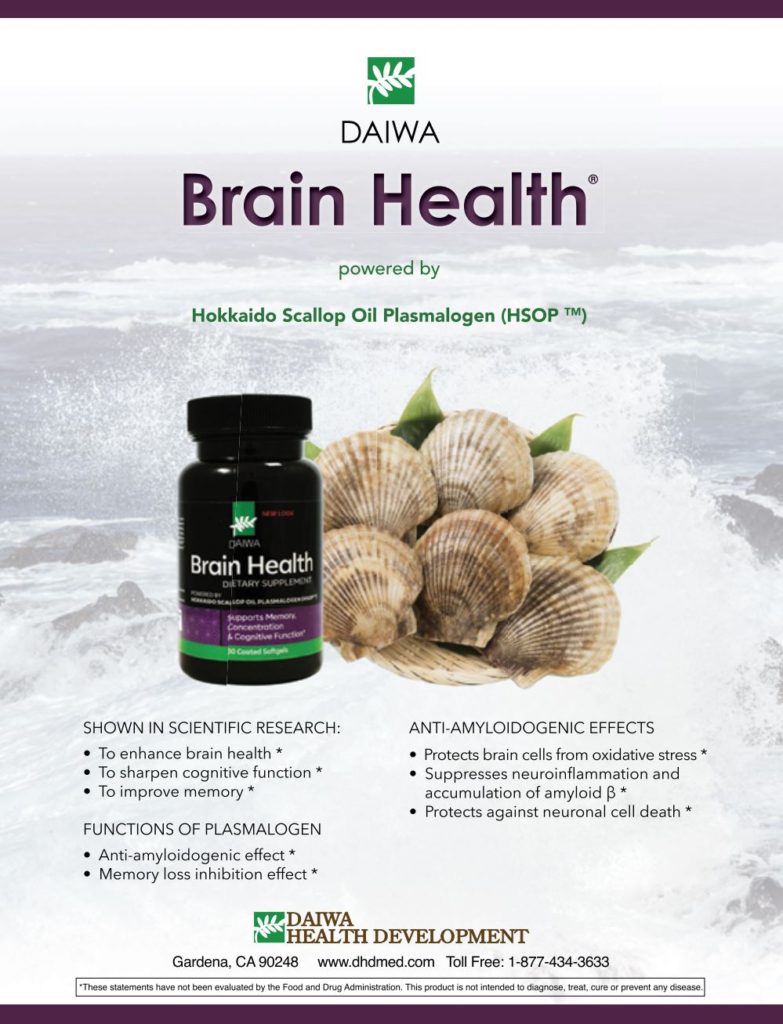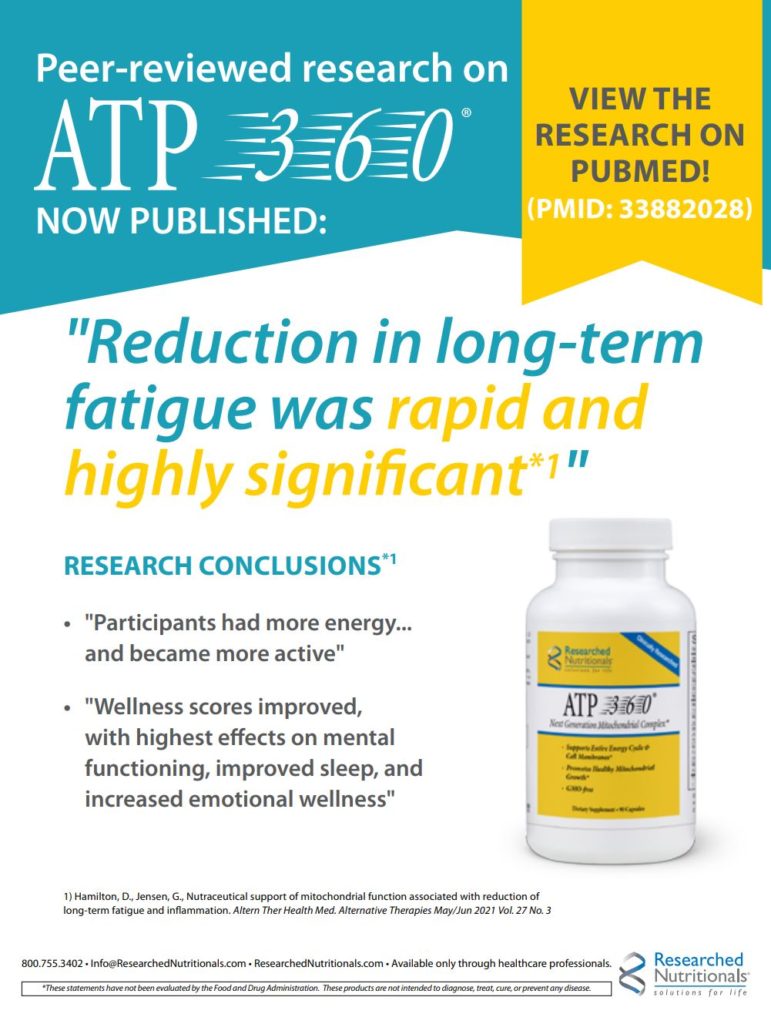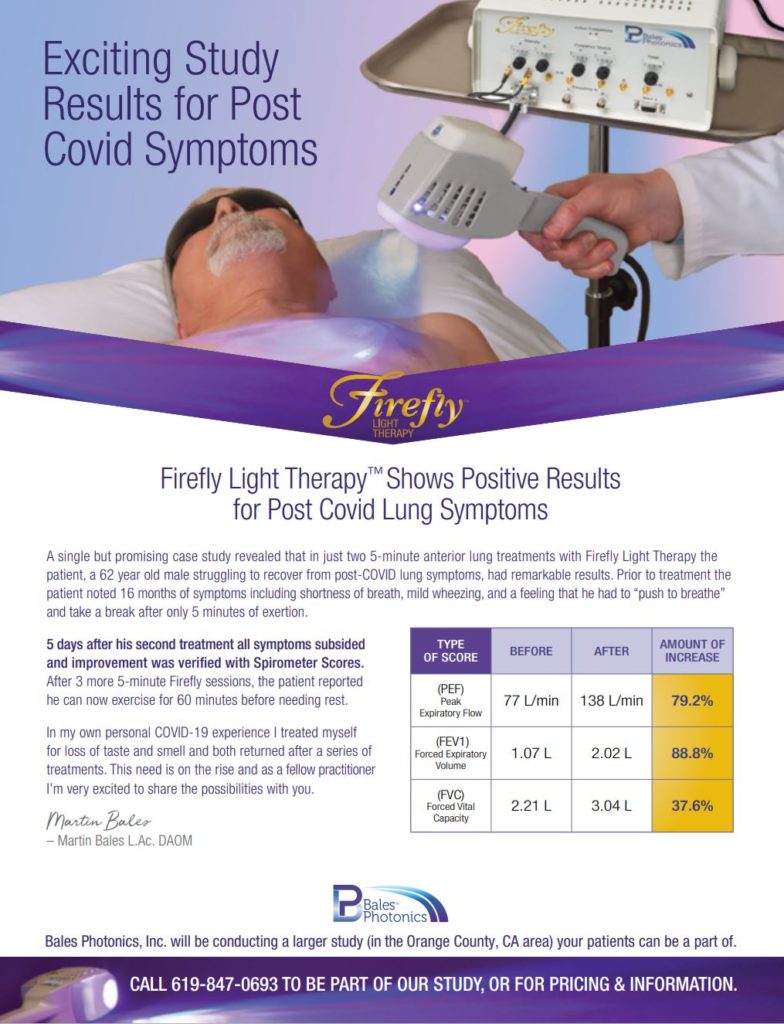By Naoki Igari1, Kentaro Ninomiya1, Hideki Katano2,3
Introduction
According to the World Health Organization (WHO), the number of patients with dementia as of 2019 was 55.2 million in the world, and this number is estimated to increase to 78 million in 2030 and 139 million in 2050.1 In addition, as of 2015, an estimated 322 million people had depression. The population of patients with depression exceeded 4% of the total world population, indicating that one in 25 people had depression.2 These statistics clearly show that it is urgent to take measures concerning dementia and psychiatric disorders. Although dementia is categorized into several types, including Alzheimer’s disease and others, brain inflammation due to oxidative stress is commonly involved in its onset. Although psychiatric disorders are considered to be triggered by genetic or environmental factors, their pathogenesis has not yet been elucidated. However, autopsies of the brains of patients with psychiatric disorders and analyses of animal models suggest that their onset is caused by brain inflammation due to oxidative stress.
Plasmalogen is a type of phospholipid and a major component of cell membranes. This substance possesses potent antioxidant properties compared to other types of lipids, which are attributed to its specific molecular structure, known as vinyl ether bonds. Plasmalogen is quickly oxidized when active oxygen is generated, thereby protecting the cells. Plasmalogen is ubiquitous in the human body and is especially abundant in the brain and heart.3 The weight of the human brain accounts for approximately 2% (1.2 to 1.6 kg) of total body weight in adults; however, the brain consumes 20% of the body’s total oxygen supply and 25% of the body’s blood glucose supply. These ratios are significantly high when the weight ratio is considered. The brain is constantly exposed to oxidative stress due to its high oxygen consumption. One of the reasons why plasmalogen is more abundant in the brain than in other organs may be that the brain needs to be maintained in healthy conditions by suppressing oxidative stress.
Plasmalogen is known to decrease with age. The blood plasmalogen levels in older individuals (average age, 65.5 years) are reported to be approximately 40% lower compared to the levels in young people (average age, 23.5 years).4 Furthermore, it has been reported that patients with Alzheimer’s-type dementia have lower blood plasmalogen levels than healthy subjects, especially in the type of plasmalogen that is bound to docosahexaenoic acid (DHA).5,6 In addition, plasmalogen levels are correlated with the severity of dementia symptoms. Patients with severe symptoms of dementia were shown to have lower plasmalogen levels in the brain than those with mild symptoms.7
A previous study showed that administration of scallop-derived plasmalogens at 0.5 or 1 mg per day to patients with mild cognitive impairment or Alzheimer’s disease improved their cognitive functions and increased blood plasmalogen levels.8, 9 Previous animal studies have demonstrated that oral administration of plasmalogen suppresses inflammation in the brain and improves memory impairment.10 Plasmalogens have been reported to inhibit cell death in the hippocampus by activating phosphoinositide 3-kinase-dependent serine/threonine-specific protein kinase and extracellular signal-regulating kinase.11 Based on these results, we propose that the effect of plasmalogen in reducing inflammation and inhibiting neuronal death may be effective in improving cognitive function.
As mentioned above, brain inflammation caused by oxidative stress is believed to be involved in the onset of mental disorders; therefore, plasmalogens are expected to be effective for mental disorders because they can inhibit brain inflammation. In this study, we administered scallop-derived plasmalogen to healthy participants and investigated changes in their mental status to evaluate the effect of plasmalogen.
Materials and Methods
Test supplement. HSOP (Hokkaido Scallop Oil Plasmalogen) (Daiwa Pharmaceutical Co., Ltd.) is scallop-derived plasmalogen. Softgel capsules containing 0.5 mg HSOP per capsule were prepared. Scallop-derived plasmalogen contains higher concentrations of omega-3 fatty acids (DHA and EPA [eicosapentaenoic acid]) than does chicken-derived plasmalogen.
Participants. Forty-six healthy participants (average age, 43.9 years; 20 males and 26 females) were provided adequate information in advance, and informed consent was obtained from them.
Administration of test food. All participants received the HSOP capsules, 1 capsule daily for three months. The test period was from June 8 to September 8, 2020.
Evaluation of psychological status. The short version of POMS2 (Profile of Mood States 2), which is internationally applicable as a tool to objectively evaluate psychological states, including mood, feelings, and emotions, was used in this study. A set of 15 questions was added to this test. This evaluation was carried out four times in total: at baseline and at one, two, and three months post-baseline.
In the short version of the POMS2, participant’s self-ratings for each question were quantified as follows: 0, not at all; 1, a little; 2, some; 3, well; and 4, very well. Each self-rating for all 35 questions was composed of seven scales of measure: anger-hostility (AH), confusion-bewilderment (CB), depression-dejection (DD), fatigue-inertia (FI), tension-anxiety (TA), vigor-activity (VA), and friendliness (F). The Total Mood Disturbance (TMD) was determined by calculating the above factors.
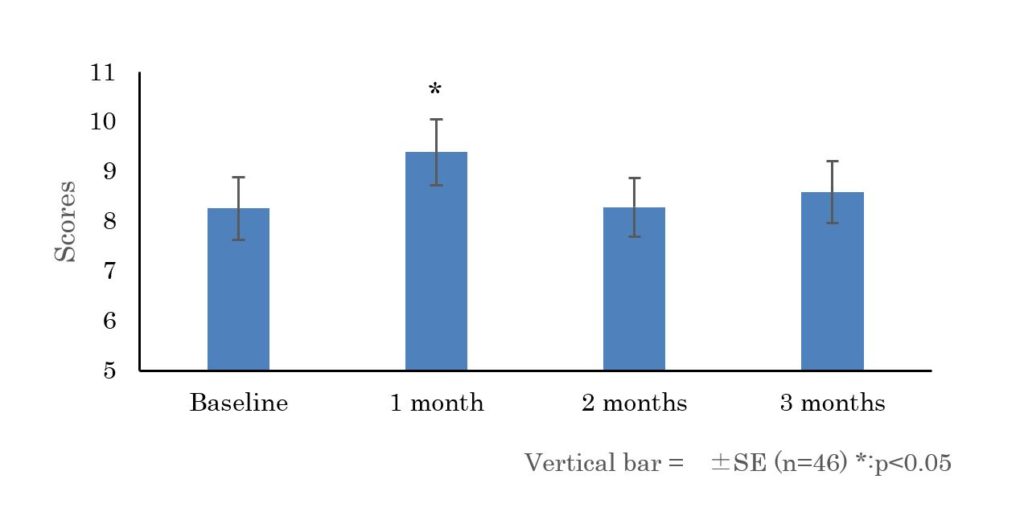
The additional questions were as follows: “Stuffy head or dull feeling,” “memory relapse (e.g., difficulties in remembering other person’s name),” “difficulties in maintaining concentration and persistence,” “difficulties in hearing conversations or TV sounds,” “excessively sensitive to smells,” “blurred vision and eye fatigue,” “improvement of quick witted or reaction speed,” “having difficulty falling asleep or sleeping badly,” “non- continuous sleep,” “waking up several times for bathroom during the night,” “having trouble in getting up,” “constipation,” and “frequent diarrhea.” Self-rating scores for additional questions were quantified using the same procedure.
Results and Discussion
The results of the short version POMS2 showed that vigor-activity (VA) significantly increased one month after baseline (p=0.040) (Figure. 1, ABOVE).
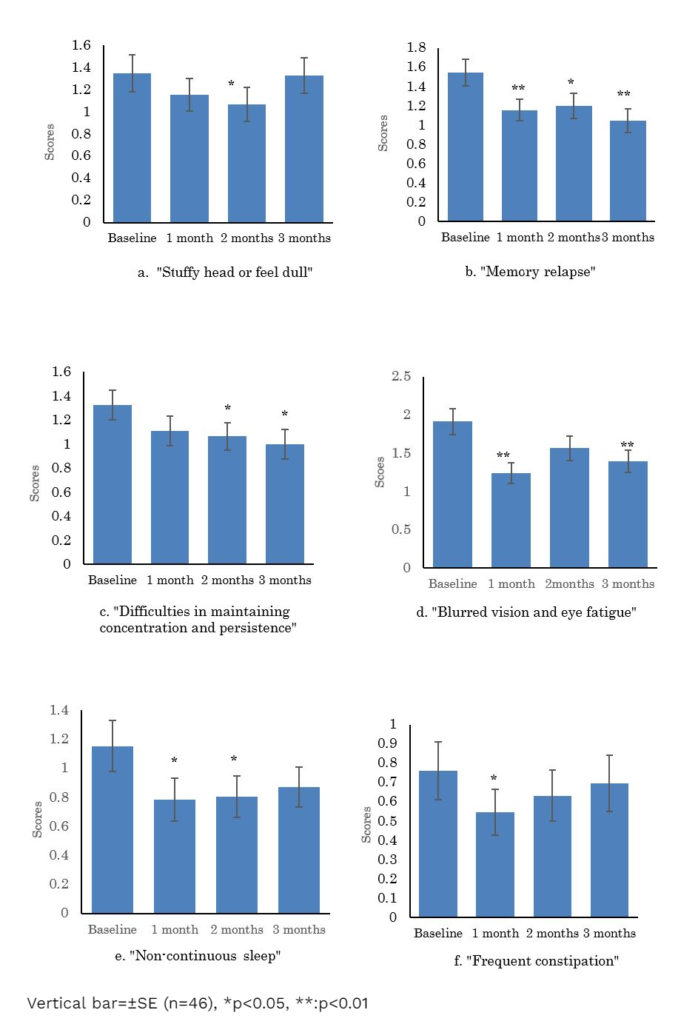
The results of the self-rating scores for additional questions showed that “stuffy head or dull feeling” significantly decreased two months after baseline (p=0.036) (Fig. 2a). A significant decline in “memory relapse (e.g., difficulties in remembering other person’s name)” was observed one, two, and three months after baseline (p=0.008, p=0.014, and p=0.002, respectively) (Fig. 2b), and “difficulties in maintaining concentration and persistence” significantly improved after two and three months (p=0.044 and p=0.031, respectively) (Fig. 2c). “Blurred vision and eye fatigue” were significantly reduced after one and three months (p=0.000 and p=0.007, respectively) (Fig. 2d). A significant decrease was observed in “having difficulty in falling asleep or sleeping badly” after one and two months (p=0.028 and p=0.048, respectively) (Fig. 2e). A significant decrease was seen in “constipation” after one month (p=0.017) (Fig. 2f). There was no significant difference in the self-rating scores for the other questions.
Plasmalogens have potent antioxidant activities and are expected to suppress brain inflammation caused by oxidative stress. Considering that brain inflammation may be involved in mental disorders, including depression, fatigue, the results of this study can be attributed to the effect of scallop-derived plasmalogen in suppressing brain inflammation.
This study suggests that the administration of scallop-derived plasmalogen (0.5 mg/day) may be effective for the prevention of mental disorders; enhancement of vitality, memory, and concentration; and improvement of eye fatigue, sleep, and constipation. This study was limited by its small sample size. Therefore, further studies are needed in the future to evaluate the effect of scallop-derived plasmalogen on mental states.
References
1. World Health Organization, Global status report on the public health response to dementia: executive summary, 2021
2. World Health Organization, Depression and Other Common Mental Disorders, Global Health Estimates, 2017
3. Braverman NE, Moser AB. Biochimica et Biophysica Acta. 1822 (2012) 1442–1452
4. Maeba R, et al., Journal of Atherosclerosis and Thrombosis. Vol.14, No.1, 12 – 18, 2006
5. Oma S, et al., Dement Geriatr Cogn Disord Extra. 2012;2:298–303
6. Yamashita S, et al., Journal of Alzheimer’s Disease. 50 (2016) 527–537
7. Goodenowe DB, et al., Journal of Lipid Research. Vol 48, 2007
8. Fujino T, et al., EBioMedicine. 17 (2017) 199–205
9. Fujino T, et al., J Alzheimers Dis Parkinsonism. 2019, Vol 9:4
10. Hossain MS, et al., Biochemical and Biophysical Research Communications. 496 (2018) 1033e1039
11. Hossain MS, et al., PLOS ONE. December 2013, Vol 8, Issue 12, e83508
*AUTHOR REFERENCE
Naoki Igari1, Kentaro Ninomiya1, Hideki Katano2,3
1. Department of R&D, Daiwa Pharmaceutical Co., Ltd.
2. Venex Co., Ltd.
3. Nippon Sport Science University

